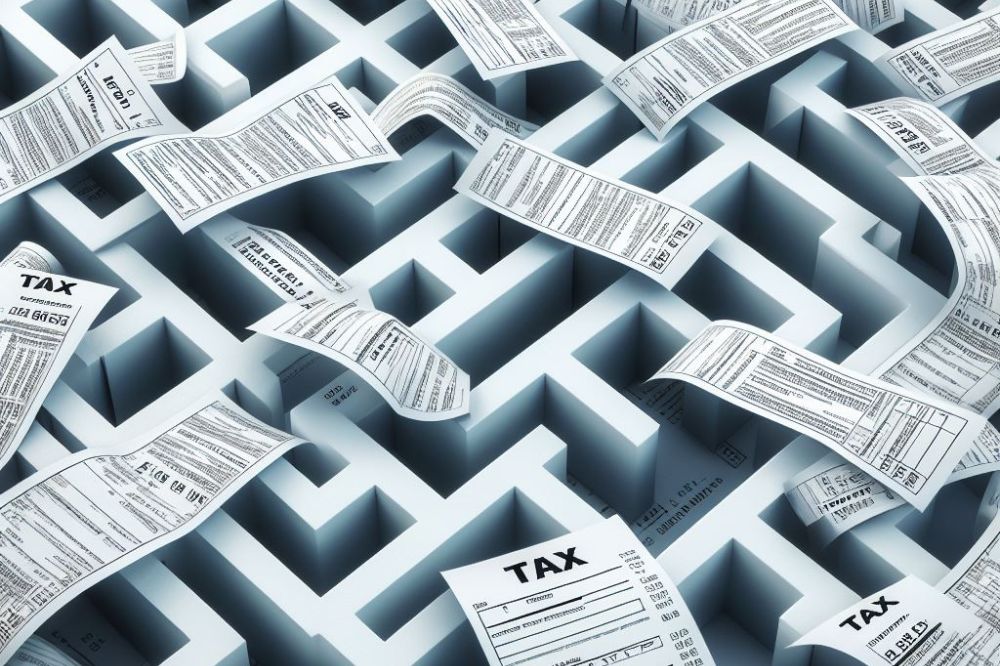Did you know that filing for bankruptcy can have significant tax consequences? When navigating the complex world of bankruptcy, understanding how it affects your taxes is crucial. From potential tax debts being discharged to the treatment of assets, knowing the tax implications can help you make informed decisions during this challenging time.
Bankruptcy may trigger taxable events or impact your ability to utilize certain tax benefits. Being aware of these implications can prevent unexpected tax bills down the road and ensure compliance with tax laws. Stay tuned to learn how bankruptcy and taxes intersect in ways you might not have anticipated.
Key Takeaways
- Understanding the tax implications of bankruptcy is crucial for individuals and businesses seeking financial relief.
- Different bankruptcy chapters, such as Chapter 7 and Chapter 13, have varying impacts on tax obligations and assets.
- Bankruptcy estates play a significant role in determining how taxes are handled during the bankruptcy process.
- Corporate and partnership bankruptcies involve complex tax considerations that can affect both the entity and its owners.
- Federal tax claims in bankruptcy proceedings can impact the distribution of assets and the discharge of debts.
- Discharge and debt cancellation through bankruptcy can have tax consequences that individuals should be aware of.
Understanding Bankruptcy Taxation
Bankruptcy Code Compliance
Understanding the legal framework for bankruptcy tax implications is crucial. Ensure compliance with the Bankruptcy Code regulations to avoid any legal issues. Know the implications of bankruptcy on tax obligations to navigate the process effectively.
Tax Returns Pre-Bankruptcy
Review and organize tax returns before filing for bankruptcy to streamline the process. Consider any pending tax refunds or liabilities that might affect your financial situation. Analyze the impact of pre-bankruptcy tax returns on the overall bankruptcy process for better planning.
Post-Bankruptcy Filings
File necessary tax documents after completing the bankruptcy process promptly. Update tax filings to reflect the bankruptcy status accurately to comply with regulations. Understand the timeline and requirements for post-bankruptcy tax filings to avoid any delays or penalties.
Debtor’s Election Options
Explore different options available to debtors regarding tax elections to make informed decisions. Understand how debtor’s elections can significantly impact tax liabilities during and after bankruptcy. Evaluate the best election options based on individual circumstances, seeking professional advice when needed.
Individual Bankruptcy Chapters
Chapter 7 and 11
Chapter 7 and Chapter 11 bankruptcy differ significantly in tax implications. Chapter 7 involves the liquidation of assets to pay off debts, with any resulting gains subject to taxation. On the other hand, Chapter 11 allows for reorganization without immediate liquidation, potentially impacting tax obligations differently.
When considering tax implications, it’s crucial to note that Chapter 7 may lead to the discharge of certain tax debts. In contrast, Chapter 11 reorganization plans can impact how taxes are treated during the process. Individuals must carefully assess their financial situation to determine which chapter aligns best with their tax circumstances.
Analyzing the suitability of each chapter based on tax considerations is essential. Chapter 7 may be more beneficial for those seeking a quicker resolution and potential discharge of specific tax debts. In contrast, Chapter 11 offers more flexibility in managing tax obligations during the restructuring process.
Chapter 12 and 13
Chapter 12 and Chapter 13 bankruptcies come with their own set of unique tax implications. Chapter 12, designed for family farmers and fishermen, provides specific provisions related to income averaging for tax purposes. In comparison, Chapter 13 involves creating a repayment plan over three to five years that can impact how taxes are managed.
When comparing Chapter 12 and Chapter 13 from a tax perspective, individuals must consider the nature of their income and assets. Family farmers or fishermen may find Chapter 12 more favorable due to its specialized provisions regarding income treatment for tax purposes. However, those with regular income streams might benefit more from the structured repayment plan under Chapter 13.
Evaluating the benefits and drawbacks of Chapter 12 versus Chapter 13 requires a thorough understanding of one’s financial situation. While Chapter 12 offers unique advantages for specific professions, such as income averaging benefits, Chapter 13 provides a structured approach to repay debts over time while potentially managing tax liabilities effectively.
Bankruptcy Estate Implications
Estate Income and Deductions
Estate income plays a crucial role in determining tax obligations during bankruptcy. Any income generated by the bankruptcy estate is subject to taxation, impacting both the estate and creditors. It’s essential to accurately report and account for all sources of income to avoid potential tax liabilities.
Identifying deductible expenses related to estate income is vital for managing taxes effectively during bankruptcy. Certain expenses incurred in generating estate income may be eligible for deductions, reducing the overall taxable income. Understanding these deductions can help optimize tax outcomes for the bankruptcy estate.
The treatment of estate income and deductions for tax purposes requires careful consideration to ensure compliance with relevant regulations. Proper documentation and reporting are essential to substantiate income and expenses accurately. Failure to adhere to tax requirements can result in penalties or additional financial burdens on the bankruptcy estate.
Tax Reporting for Chapter 11
Compliance with specific tax reporting requirements is paramount in Chapter 11 bankruptcy cases. The complexities of Chapter 11 proceedings necessitate thorough and precise tax reporting to meet legal obligations. Engaging qualified professionals can provide expertise in navigating the intricate tax landscape of Chapter 11 bankruptcies.
Understanding the nuances of tax reporting in Chapter 11 cases is essential for maintaining transparency and accountability throughout the process. Detailed record-keeping and adherence to reporting deadlines are critical components of successful tax management in Chapter 11 bankruptcies. Timely submission of accurate reports helps prevent delays or complications in the bankruptcy proceedings.
Ensuring accurate and timely tax reporting throughout the Chapter 11 process is key to avoiding potential disputes or challenges from stakeholders. Clear communication regarding tax matters can foster trust and cooperation among parties involved in the bankruptcy proceedings. Proactive management of tax reporting enhances overall efficiency and effectiveness in resolving Chapter 11 cases.

Corporate and Partnership Bankruptcy
Filing Requirements
Familiarize yourself with the filing requirements during bankruptcy. Ensure all necessary documents are submitted promptly to avoid delays. Understand that missing deadlines can lead to complications in the bankruptcy process.
Ensure compliance with all tax filing obligations post-bankruptcy. It’s crucial to meet all tax deadlines to prevent further financial issues. Failure to fulfill these obligations can result in penalties and legal consequences.
Understand the specific filing requirements based on the type of bankruptcy. Different types of bankruptcy, such as Chapter 7 or Chapter 11, have distinct tax implications. Be aware of these variances to navigate the process effectively.
Determination of Tax
Determine the tax liabilities and obligations during bankruptcy proceedings accurately. Seek professional guidance to ensure you fulfill all tax responsibilities correctly. Incorrect reporting can lead to audits and additional financial burdens.
Calculate the amount of tax owed based on bankruptcy status diligently. Consider factors like income, assets, and debts when determining your tax obligations. Accurate calculations are essential for a smooth bankruptcy process.
Understand the factors that influence the determination of tax in bankruptcy thoroughly. Factors such as the type of debt, assets involved, and income levels impact your tax liabilities. Stay informed about these variables to manage your finances effectively.
Federal Tax Claims in Bankruptcy
Court Jurisdiction
The court plays a crucial role in determining tax matters during bankruptcy proceedings. It holds the authority to make decisions regarding tax issues that arise in bankruptcy cases. By following court decisions, individuals can gain insights into how tax jurisdiction is managed within bankruptcy.
Understanding the jurisdiction of the court over tax issues is essential for navigating bankruptcy cases effectively. The court’s oversight ensures that tax-related matters are addressed appropriately and in compliance with legal requirements. Keeping abreast of court rulings on tax jurisdiction helps stakeholders stay informed and make informed decisions.
Unsecured Tax Claims
In bankruptcy, it is vital to identify unsecured tax claims as they represent debts without collateral backing. These claims are typically not prioritized over secured debts but are still significant in the bankruptcy process. Understanding how unsecured tax claims are treated provides clarity on their impact on the overall proceedings.
When evaluating the impact of unsecured tax claims on bankruptcy, it is essential to recognize their implications for creditors and debtors alike. Prioritizing these claims and understanding their implications can help streamline the bankruptcy process and ensure equitable treatment for all parties involved.
Discharge and Debt Cancellation
Exclusions from Income
During bankruptcy, specific types of income can be excluded from taxation, providing relief to individuals facing financial distress. Understanding these exclusions is crucial for navigating the tax implications of bankruptcy effectively. Certain criteria must be met to qualify for excluding particular income from tax calculations.
For individuals going through bankruptcy, it’s essential to know that not all income obtained during this period is subject to taxation. Excluded income may include certain social security benefits, child support payments, and specific retirement account distributions. By recognizing these exclusions, individuals can better manage their financial situation post-bankruptcy.
In bankruptcy cases, the criteria for excluding income from tax calculations are stringent. Meeting these requirements is vital to ensure that individuals receive the full benefit of these exclusions. Proper documentation and adherence to regulations are necessary steps in determining which income can be excluded from taxation during bankruptcy proceedings.
Reduction of Tax Attributes
Exploring strategies to reduce tax attributes in bankruptcy can significantly impact an individual’s overall tax liabilities. By implementing effective techniques for reducing tax attributes, individuals can mitigate the tax consequences associated with bankruptcy. Understanding the implications of these reductions is crucial for managing one’s finances post-bankruptcy.
Reducing tax attributes involves strategic planning and careful consideration of various factors. Implementing these techniques requires a thorough understanding of tax laws and regulations governing bankruptcy proceedings. By reducing specific tax attributes, individuals can lower their overall tax liabilities and achieve greater financial stability after emerging from bankruptcy.
Implementing effective techniques for reducing tax attributes during bankruptcy proceedings requires expertise and attention to detail. By strategically managing these reductions, individuals can optimize their tax situation and minimize the financial impact of bankruptcy on their long-term financial health.
Tax Help and Advocacy
Taxpayer Advocate Service
The Taxpayer Advocate Service is a valuable resource for individuals dealing with tax implications in bankruptcy. This service offers assistance in navigating complex tax issues during the bankruptcy process. By seeking help from the Taxpayer Advocate Service, taxpayers can receive guidance on resolving disputes related to taxes.
Understanding the role of the Taxpayer Advocate Service is crucial for individuals facing tax challenges in bankruptcy. This service acts as an advocate for taxpayers, ensuring that their rights are protected and that they receive fair treatment throughout the bankruptcy proceedings. Utilizing the expertise of the Taxpayer Advocate Service can significantly benefit individuals struggling with tax implications post-bankruptcy.

Low Income Taxpayer Clinics
For individuals with limited financial resources, accessing Low Income Taxpayer Clinics can be instrumental in handling tax matters during bankruptcy. These clinics provide guidance and support to low-income individuals facing tax issues, offering specialized assistance tailored to their unique financial circumstances.
Seeking help from Low Income Taxpayer Clinics can offer a lifeline to those struggling with tax implications after bankruptcy. These clinics are dedicated to assisting low-income individuals in resolving their tax challenges, ensuring that they have access to the necessary resources and information to navigate the complexities of taxation post-bankruptcy. Understanding the services provided by Low Income Taxpayer Clinics is essential for individuals seeking effective solutions to their tax concerns.
Future Developments in Bankruptcy Taxation
What’s New and Reminders
Stay updated on new developments in bankruptcy tax laws to ensure compliance with the latest regulations. Recent changes may impact your tax obligations during bankruptcy proceedings, so it’s crucial to stay informed.
Review important reminders about the tax implications of bankruptcy to avoid any surprises during the process. Understanding these implications can help you make informed decisions and plan accordingly for your financial future.
Be informed about recent updates and key points related to bankruptcy tax regulations. Being aware of any changes can help you navigate the complex intersection between bankruptcy and taxation effectively.
Essential Guides and Resources
Publication 908 Highlights
Publication 908 provides essential insights into the tax implications of bankruptcy. It outlines key information for individuals facing tax challenges during the bankruptcy process. The publication offers detailed guidance on navigating tax matters amidst bankruptcy proceedings.
Taxpayers can benefit from exploring Publication 908 to gain a better understanding of how bankruptcy impacts their tax obligations. By referring to this resource, individuals can access valuable information that helps them handle taxes effectively during bankruptcy. The highlights in Publication 908 shed light on crucial aspects of managing taxes in the context of bankruptcy.
Useful Items for Taxpayers
For taxpayers grappling with the complexities of bankruptcy, several useful resources are available to provide assistance. These resources include tools and guides tailored to help individuals manage their tax responsibilities amid bankruptcy proceedings. By utilizing these recommended items, taxpayers can streamline the process of addressing tax issues while navigating through bankruptcy.
Accessing helpful items designed specifically for taxpayers dealing with bankruptcy can significantly ease the burden of managing tax obligations during such challenging times. These resources aim to empower individuals by providing them with practical solutions and guidance to effectively handle tax matters within the realm of bankruptcy.
Closing Thoughts
In understanding bankruptcy taxation, you’ve uncovered crucial insights into individual and corporate implications, federal tax claims, discharge, and available resources. By navigating these complexities, you can make informed decisions to mitigate tax burdens during financial challenges. Stay proactive in seeking tax help and advocacy to secure your financial future amidst bankruptcy proceedings.
Explore the essential guides and resources provided to deepen your knowledge and navigate the intricate landscape of bankruptcy taxation effectively. Your awareness and proactive approach can significantly impact your financial well-being. Take charge of your tax implications in bankruptcy to pave the way for a more stable and secure financial future.
Frequently Asked Questions
What are the tax implications of filing for bankruptcy?
Filing for bankruptcy can have various tax implications depending on the type of bankruptcy filed. Understanding how bankruptcy affects your taxes is crucial to avoid surprises and plan ahead effectively.
Are federal tax claims treated differently in bankruptcy proceedings?
Yes, federal tax claims in bankruptcy are given priority over other types of debt. It’s essential to be aware of how these claims are handled to navigate the bankruptcy process successfully.
Can debts discharged through bankruptcy impact my future tax obligations?
Debts that are discharged through bankruptcy are usually not considered taxable income. This benefit provides relief to individuals or businesses seeking a fresh financial start post-bankruptcy.
How can I find tax help and advocacy during the bankruptcy process?
Seeking professional guidance from tax experts or advocates specializing in bankruptcy taxation can provide valuable assistance in navigating complex tax issues related to your bankruptcy case.
What resources are available for understanding bankruptcy taxation better?
Utilizing essential guides and resources dedicated to bankruptcy taxation can equip you with the knowledge needed to make informed decisions and manage your tax obligations effectively during and after a bankruptcy filing.




